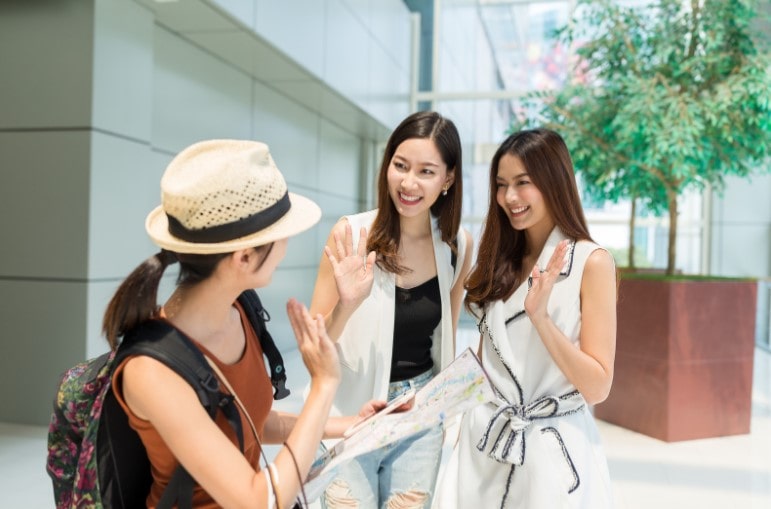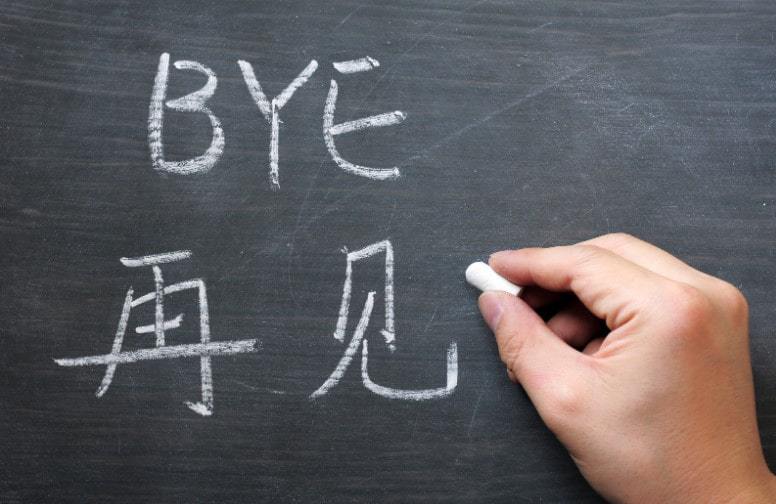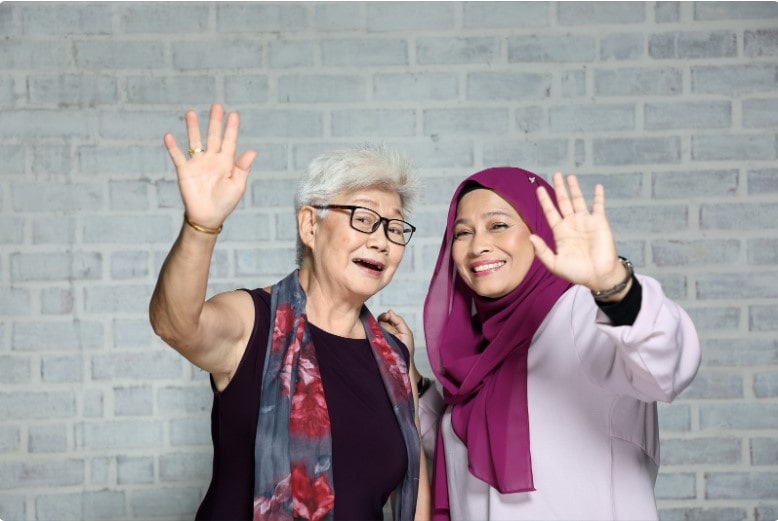The 15 Most Common Ways to Say Goodbye in Chinese

Maybe you already know how to say “hello” in Chinese but you don’t know how to say “goodbye” in Chinese yet.
Or you already know the most common and simple way to say “goodbye” in Mandarin – 再见 (zàijiàn), but you want to learn other ways to say “farewell” in Chinese.
Either way, this article will help you understand how native Chinese speakers say “bye”. Just have a look at this list of 15 ways to say “bye” in Mandarin, and you will soon sound like one of them.

1. “Goodbye” in Chinese – 再见 (zàijiàn)
If you search the internet for “How do you say bye in Chinese?”, I guarantee that 再见 (zàijiàn) will be the first answer.
But did you know that it’s actually closer to “see you soon” than “goodbye”?
In Chinese, 再 (zài) means “again” and 见 (jiàn) is “to see”, so when you say it, you’re expecting to see this person again.
Even though it’s not a mistake to say it in almost any situation, it won’t hurt to learn other ways to say “goodbye” in Chinese.
2. “Say Goodbye” or “Bid Farewell” in Chinese – 告别 (gàobié)
When you assume you won’t see a person again soon and usually when you want to be formal too, 告别 (gàobié) is the perfect way to say “goodbye” in Chinese.
For example, 我是来向你告别的 (wǒ shì lái xiàng nǐ gàobié de, “I came to say goodbye to you”) is something that you probably wouldn’t say to your friend, but rather a business acquaintance or an older person.
3. “Bye bye” in Chinese – 拜拜 (bàibài)
If you’ve ever met a young Taiwanese person, I’m sure you already know 拜拜 (bàibài) – “bye bye”.
It’s not just people from Taiwan who say bye this way, but it’s mostly on this island where you’ll hear it at every step.
It’s exactly what it sounds like, “bye bye”, because it’s a loanword from English. You’d be okay to just say 拜 (bài) but the native Chinese speakers almost always say both of them.
4. “See you later” in Chinese – 回头见 (huítóu jiàn)
Another “goodbye” in Chinese, but this one really emphasizes that you’ll see each other later again.
Try to imagine a situation: you and your friend are leaving a classroom or an office meeting, and are you both rushing to continue with your day. You know that you’ll see each other later, for example at lunch.
It could go like this:
A: 我需要快点去我的办公桌。(Wǒ xūyào kuài diǎn qù wǒ de bàngōng zhuō.) – “I need to hurry up and go to my desk.” B: 好吧,我也要快点去。午休见! (Hǎo ba, wǒ yě yào kuài diǎn qù. ǔxiū jiàn.) – “Okay, I also need to go quickly. See you at lunch break!” A: 那好吧, 回头见! (Nà hǎo ba, huítóu jiàn!) – “Alright then, see you later!”
With this example in mind, it’s also easy to remember that Chinese native speakers use the format of “xx 见” (xx jiàn, “xx see”) to form the expression: “see you xx (a certain time)”.
You’ll see what I mean below:
5. “See you tomorrow” in Chinese – 明天见 (míngtiān jiàn)
The perfect example of how “see you xx” is formed in Chinese. Similarly to English, where the “when” is replaced at the end, Chinese speakers replace their “when”, but at the beginning.
So 明天见 (míngtiān jiàn, “see you tomorrow”) can be changed to 星期三见 (xīngqísān jiàn, “see you Wednesday”) or, for example, 下周见 (xià zhōu jiàn, “see you next week”) or even 下学期见 (xià xuéqí jiàn, “see you next term”).
6. “See you soon” in Chinese – 一会儿见 (yīhuì'er jiàn)
While 一 (yī) is “one” in Chinese and 会 (huì) has more meanings, for example, “meeting”, “can” or “be able to”, when they’re together, they take on a different meaning.
一会儿 (yīhuǐ'er) means “a while”, “a moment” or “a bit” in the context of time.
一会儿见 (yīhuǐ'er jiàn) then means not only “see you soon”, but also “see you in a bit” or even “bye bye now”.

7. “Take care” in Chinese – 照顾自己 (zhàogù zìjǐ)
When saying bye in English, we sometimes use “take care” and in Chinese this is 照顾自己 (zhàogù zìjǐ).
It’s common to also go a bit further with your niceness and say 好好照顾自己 (hǎohao zhàogù zìjǐ, “take good care of yourself”).
It may be no surprise for you to discover that 照顾 (zhàogù) is not only used to say “take care” when you’re parting ways with someone. Similarly to English, it’s used in contexts of looking after and caring for. When that’s the case, 自己 (zìjǐ, “(one)self”) is replaced with another pronoun or a noun.
Here’s a couple of examples:
- 她照顾孩子。(Tā zhàogù háizi.) – “She takes care of the children.”
- 我病了。请多多照顾。(Wǒ bìngle. Qǐng duōduō zhàogù.) – “I’m sick. Please, take care of me.”
- 下周请你照顾我的狗吗?(Xià zhōu qǐng nǐ zhàogù wǒ de gǒu ma?) – “Can you please look after my dog next week?”
8. “Have a nice day” in Chinese – 祝你今天愉快 (zhù nǐ jīntiān yúkuài)
“Have a nice day” is not a common sentence in Chinese. Of course, it makes sense when you translate 祝你今天愉快 (zhù nǐ jīntiān yúkuài) word by word; if you did that, it’d look like this: “wish you today happy”.
The difference between the English and Chinese version is not only in the way it’s grammatically formed, but also cultural background.
You might recognize 祝 (zhù, “to wish”) from sentences like 祝你一路平安 (zhù nǐ yīlù píng'ān, “have a safe journey”) (even though even the 祝 can be omitted).
But to say “Have a nice day” in Chinese might sound a bit awkward when translated word by word.
Instead, say 玩的开心 (wán de kāixīn, “have fun”) or 祝你愉快 (zhù nǐ yúkuài, “I wish you happiness”) and you’ll sound more like a native.
9. “I’m off” in Chinese – 我走了 (wǒ zǒule)
走 (zǒu) means “walk” or “go” in Chinese. 我走了 (wǒ zǒule) literally means “I walked” or “I went”, but it’s used as “I’m gone” or “I’m off” and is most often in a casual conversation.
Have a look at some examples of its use:
- 再十分钟,我走了。(Zài shí fēnzhōng, wǒ zǒule.) – “Ten more minutes and then I’m gone.”
- 好吧,我们完成了,我走了。(Hǎo ba, wǒmen wánchéngle, wǒ zǒule.) – “All right, we’re done, I’m off.”
10. “I’m leaving” in Chinese – 告辞 (gào cí) or 失陪 (shī péi)
These are very formal ways to say goodbye in Chinese. When you’re in a formal, polite setting and you want to announce your departure, either one is acceptable.
告辞 (gào cí, “farewell”) is similar to 告别 (gàobié), while 失陪 (shī péi) means something like “leaving someone’s company”. It’s actually used as a whole sentence: “Excuse me, but I must be leaving you now”.
11. “Speak to you later” in Chinese – 有空再聊 (yǒu kòng zài liáo)
The same way in English we say “speak to you later”, in Chinese it is 有空再聊 (yǒu kòng zài liáo).
However, it literallymeans “when you’re free, talk again” or “talk again when you have some time”.
Just like with the English version, this way of saying bye in Chinese is mostly common in informal settings, with friends and family.
12. “I look forward to seeing you again” in Chinese – 期待见到你 (qídài jiàn dào nǐ)
期待 (qídài) means “look forward to” and also “expect” in some contexts, so this way of saying bye in Chinese is almost the same as it is in English.
见到 (jiàn dào, “to see”). You might recognize 见 (jiàn) from other phrases that you’ve seen in this article. 到 (dào) is a grammatical complement to express one of the following: “to”, “until”, result complements, and others. In this case, it simply means “until”.
Although 见面 (jiànmiàn) means “to meet”, 见到 (jiàn dào) also means “to meet” in certain situations, so you need to be careful about the context, as you’ll see below:
13. “It was nice seeing you” and “It was nice meeting you” in Chinese – 我很高兴再次见到你 (wǒ hěn gāoxìng zàicì jiàn dào nǐ) and 我很高兴见到了你 (wǒ hěn gāoxìng jiàn dàole nǐ)
You might already be familiar with 认识你我很高兴 (rènshí nǐ wǒ hěn gāoxìng) or 很高兴见到你 (hěn gāoxìng jiàn dào nǐ) – both mean “nice to meet you” or “I’m very happy to meet you”. That’s because 高兴 (gāoxìng, “happy/glad”) is one of the words that you learn in early Chinese lessons.
So to say “it was nice to see you” or “it was nice meeting you” will be easy for you to figure out.
Like I mentioned before, 见到 (jiàn dào) means “to see” or “to meet” depending on the context. As you can see 我很高兴再次见到你 (wǒ hěn gāoxìng zàicì jiàn dào nǐ) contains 再次 (zàicì, “again” or “once again”), so you can assume that you’ve met this person before, therefore the translation is “it was nice to see you (again)”.
Whereas 我很高兴见到了你 (wǒ hěn gāoxìng jiàn dàole nǐ) doesn’t include any “again” or “once again”, so it’s used when you’re speaking to a person that you just met.
14. “Later” or “Catch you later” in Chinese – 再会 (zài huì)
This expression is similar to 再见 (zàijiàn, “goodbye/bye”) but not used as often. It’s common to say this one when speaking to a friend or in any casual setting because it’s like saying “later” or “catch you later” in English.
If you look closely at each of the characters, you already know that 再 (zài) means “again” and 会 (huì) has many meanings, amongst which “moment” is the one we’re looking at in this context.
So together it means “until in a moment” or “until later” = “see you later/later”.
15. “Let’s stay in touch” – 再联系 (zài lián xì)
“Let’s stay in touch” or “keep in touch” means what it sounds like – “bye” but “we’ll contact each other later”.
But here’s the thing – it’s likely that you don’t really want to contact each other. More likely, you just want to be polite, but you both kind of know that you won’t call the other person.
Let’s have a look at an example:
A: 我很高兴见到了你。(Wǒ hěn gāoxìng jiàn dàole nǐ.) – “It was nice to meet you.” B: 我也很高兴见到了你。再联系! (Wǒ yě hěn gāoxìng jiàn dàole nǐ. Aài liánxì!) – “Likewise/it was nice to meet you, too. Let’s keep in touch!” A: 好吧, 拜拜! (Hǎo ba, bàibài!) – “Alright, bye!”
You kind of need to read between the lines, but more often than not, it’s just a polite way to say bye in Chinese.

Bye, goodbye, it was nice to meet you, have fun and have a nice day… Your Chinese farewell vocabulary just got pretty solid!
Some phrases are different from the ones you’re used to in English and may need context, but hey, others are very similar — just look at 拜拜 (bàibài, “bye bye”).
Even if you’re just starting to learn Chinese and all you know are the basic, beginner Chinese phrases, just remember, it just takes a bit of practice to learn it all. And don’t forget that the Chinese are generally very polite and kind people, so whichever phrase you use, the native speaker will still understand you and appreciate you trying!



Social